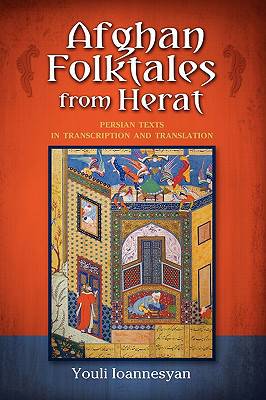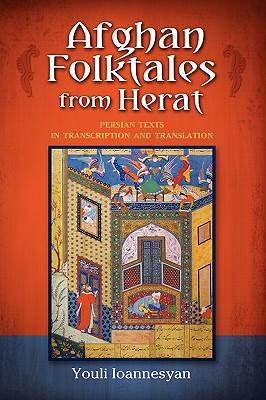
Je cadeautjes zeker op tijd in huis hebben voor de feestdagen? Kom langs in onze winkels en vind het perfecte geschenk!
- Afhalen na 1 uur in een winkel met voorraad
- Gratis thuislevering in België vanaf € 30
- Ruim aanbod met 7 miljoen producten
Je cadeautjes zeker op tijd in huis hebben voor de feestdagen? Kom langs in onze winkels en vind het perfecte geschenk!
- Afhalen na 1 uur in een winkel met voorraad
- Gratis thuislevering in België vanaf € 30
- Ruim aanbod met 7 miljoen producten
Zoeken
Afghan Folktales from Herat
Persian Texts in Transcription and Translation
'Iulii Arkadevich Ioannes'ian, Youli Ioannesyan
Hardcover | Engels
€ 156,45
+ 312 punten
Omschrijving
This book presents folktales in the Herati dialect of the Afghan Persian language, along with useful transcriptions and translations. This dialect is spoken by the sedentary population of Herat city and the adjacent area situated in the northwest of Afghanistan. Historically, the area in question was part of the Persian province of Khorasan that was known for its significant role in the development of Persian culture in general and literature and philosophy in particular. Suffice it to say that the classical Persian language (Farsi) is considered to have originated in that region. For centuries, Herat has been one of the main cultural centers of the Khorasan province, and according to a reliable historic source, it was in Herat that the first poetical piece in Farsi was composed. The area was the birthplace of many most prominent Persian-speaking poets such as Ferdowsi, F. 'Attar, Khayyam, to mention a few. Others such as Jami and Ansari were originally from the Herat area and their shrines are located in the city. Given the fact that many early Persian-speaking poets came from this region (Khorasan) and from Herat in particular, their native Khorasani dialects--including Herati-- considerably influenced the language of Persian classical literature. The Herati dialect linguistic importance from the synchronic perspective is based on the fact that it serves as a bridge between the Persian dialects of western Iran and the Tajiki of Central Asia. In addition, given the geographic position of Herat (situated on the border between modern Afghanistan and Iran), its dialect also shares many common characteristics with the Persian dialects of Iran and those of Afghanistan. Despite its cultural and linguistic importance for studies in Iran, Afghanistan and Central Asia, this region has never been open to field research (especially by westerners) because of its long political instability and constant wars. There is no similar published work in English on this particular Persian dialect and its oral literature. Based on academically informed fieldwork and presented in a scientific fashion, this study provides information previously unavailable and is thus valuable to the academic discourse in Iranian linguistics. The materials were collected by the author during field research in Afghanistan in the 1980s from illiterate dialect speakers (a category which has preserved the dialect the most in terms of purity and entirety). The book helpfully provides a grammatical introduction to the Herati dialect, a glossary of dialectal and common words, as well as approximately 500 explanatory notes. This book will be of interest to linguists and language learners, especially those studying Afghan Persian. It will also be useful as a language learning aid for intermediate and advanced students of spoken Afghan Persian in general and of Persian (in the broader sense) dialectology in particular, foreign NGO workers or interpreters/translators who find themselves in the field in western Afghanistan or far eastern Iran. Though the present book is by no means a study in folklore literature or anthropology, these texts containing ethnographic data will also be of value to folklorists or ethnographers.
Specificaties
Betrokkenen
- Auteur(s):
- Uitgeverij:
Inhoud
- Aantal bladzijden:
- 340
- Taal:
- Engels
Eigenschappen
- Productcode (EAN):
- 9781604976526
- Verschijningsdatum:
- 28/12/2009
- Uitvoering:
- Hardcover
- Formaat:
- Genaaid
- Afmetingen:
- 152 mm x 229 mm
- Gewicht:
- 666 g

Alleen bij Standaard Boekhandel
+ 312 punten op je klantenkaart van Standaard Boekhandel
Beoordelingen
We publiceren alleen reviews die voldoen aan de voorwaarden voor reviews. Bekijk onze voorwaarden voor reviews.









